Now Available on Whatsapp:
+1 (888) 687-4420
Online 24/7
- College Essay
- Argumentative Essay
- Expository Essay
- Narrative Essay
- Descriptive Essay
- Scholarship Essay
- Admission Essay
- Reflective Essay
- Nursing Essay
- Economics Essay
Assignments
- Term Papers
- Research Papers
- Case Studies
- Dissertation
- Presentation
- Editing Help
- Cheap Essay Writing
- How to Order
Speech Writing
Commemorative Speech

Commemorative Speech - Writing Guide, Outline & Examples

People also read
The 10 Key Steps for Perfect Speech Writing
Understanding Speech Format - Simple Steps for Outlining
How to Start A Speech - 13 Interesting Ideas & Examples
20+ Outstanding Speech Examples for Your Help
Common Types of Speeches that Every Speechwriter Should Know
Good Impromptu Speech Topics for Students
Entertaining Speech Topics for Your Next Debate
Understanding Special Occasion Speech: Types, Steps, Examples and Tips
Introduction Speech- Tips & Examples
How to Write A Good Acceptance Speech?
Writing A Presentation Speech In English: Tips And Examples
Farewell Speech | Writing Tips & Examples
How to Write an Extemporaneous Speech? A Step-by-Step Guide
A Graduation Speech Writing Guide with Examples
Ready to explore the world of commemorative speech writing? Don't worry, it's not as tricky as it sounds!
In this guide, we'll make it super easy for you. We've got all the tips and examples you need to create perfect commemorative speeches for any occasion. Whether it's for your school project, a graduation party, or a touching tribute to someone special, we've got your back.
Let's jump in and discover the secrets to crafting speeches that leave a lasting impression.
- 1. Commemorative Speech Definition
- 2. Commemorative Speech Outline
- 3. How to Write a Commemorative Speech
- 4. Types of Commemorative Speeches
- 5. Commemorative Speech Examples
- 6. Commemorative Speech Topics
Commemorative Speech Definition
A commemorative (or ceremonial or epideictic) speech is defined as an address of honor delivered to celebrate or praise the value of a person, group, place, event, idea, or institute.
This type of speech writing is not just verbal praise or appreciation. It is more of a celebration and acknowledgment.
The Importance of Commemorative Speeches
Commemorative speeches aren't just words thrown together; they serve a significant purpose in various aspects of life.
- Commemorative speeches honor people, events, and ideas that hold significant value.
- They help us remember history, culture, and achievements, preserving them for future generations.
- Commemorative speeches inspire and connect people emotionally, fostering a sense of unity.
- These speeches offer closure and healing, particularly during funerals or memorials.
- They provide a platform for celebrating achievements and milestones.
- Through commemorations, we ensure that important moments in our lives are never forgotten, leaving a lasting legacy.
Commemorative Speech Outline
Here's a simple commemorative speech outline example template:

Paper Due? Why Suffer? That's our Job!
How to Write a Commemorative Speech
Writing a commemorative speech is a special way to pay tribute to an important event or someone's life. Here are some simple steps to help you write one:
Step 1: Start with an Attention-Grabbing Opener
Your speech needs to capture the audience's attention from the very beginning. So start your commemorative speech with a hook , a compelling story, a relevant quote, a rhetorical question, or a surprising fact. The goal is to make the audience want to listen.
Step 2: Introduce the Occasion
Clearly state the reason for your speech. Let the audience know what or who you are commemorating and why this is a significant occasion. This sets the stage for your speech's focus.
Step 3: Acknowledge Challenges or Difficulties
If the subject of your commemoration faced any difficulties in their life or in being remembered, this is the place to address those challenges. It adds depth to your speech and shows resilience.
Step 4: Express Gratitude
Thank the audience for their presence and appreciation. Also, acknowledge any individuals or organizations who have contributed to making this commemoration possible.
Step 5: Include Personal Observations
Share personal stories, anecdotes, or observations that connect you to the subject or event. This personal touch makes your speech unique and relatable.
Step 6: Pay Tribute to the Subject & Highlight Their Achievements
This is the heart of your speech. Express your admiration, respect, and appreciation for the person or the significance of the event you're commemorating. Explain why they are deserving of this honor. Dive into the subject's significant accomplishments, qualities, or contributions. Use specific examples or stories to illustrate their impact on others and the world.
Step 7: Connect to the Audience
Relate the subject's life or the event to the audience's experiences and values. Show why this commemoration matters to them and how it can resonate with their lives.
Step 8: Address Why It's Important
Explain the broader importance of this commemoration. Discuss the lasting influence, lessons learned, or the impact the subject or event has had on society, culture, or individuals.
Step 9: Conclude with a Powerful Message
Summarize the significance of the commemoration and leave the audience with a memorable and thought-provoking message. This could be a call to action, a reflection on the subject's legacy, or a meaningful quote.
Step 10: Use Visual Aids (if necessary)
Visual aids like photographs, videos, or props can enhance your speech by providing a visual element to support your words. Use them when appropriate, but ensure they add value.
Types of Commemorative Speeches
Here's a table outlining different types of commemorative speeches:
Commemorative Speech Examples
Here are some famous commemorative speeches by renowned personalities:
- Martin Luther King Jr.'s "I Have a Dream" speech
- Ronald Reagan's Challenger Disaster speech
- Maya Angelou's eulogy for Coretta Scott King
Commemorative Speech on a Famous Person
Let’s take a look at a short commemorative speech example:
Commemorative Speech Examples PDF
To provide you with tangible insights into commemorative speeches, we've provided free commemorative speech examples in this section. Let’s take a look:
Graduation Ceremony Speech Example
Commemorative Speech Example
Commemorative Speech Outline Examples
Commemorative Speech About Mom
Commemorative Speech About Parents
Commemorative Speech Manuscript Example
Commemorative Speech Examples For College Students
Tough Essay Due? Hire Tough Writers!
Commemorative Speech Topics
Choosing the right topic is essential for speech writing. Here are some interesting commemorative speech topics, take a look:
- A tribute to a loving spouse
- A tribute to caring parents
- The sacrifice of a teacher
- A perfect example of human courage
- A human who overcame a challenge
- Celebrating Islamic values
- Praising the women’s rights movement in the United States
- Respect makes any relationship better
- Hard work is the only shortcut to success.
- Teamwork improves the performance of organizations.
- Leadership is an innate ability.
Writing an inspiring speech can be tricky. But once you know what you have to write and how to structure it, the process becomes easier.
If crafting speeches proves to be a challenge, consider obtaining a professionally written speech from MyPerfectWords.com.
Our do my essays service offers tailored content for speeches, essays, research papers, term papers, and reports.
Don't wait! Hire an experienced writer now to buy speech .
Frequently Asked Questions
What is the core element of any commemorative speech.
The core elements of any commemorative speech typically include:
- Honoring: Paying tribute to the person, event, or idea being commemorated.
- Celebration: Celebrating achievements, contributions, or significance.
- Reflection: Reflecting on the impact and legacy of the subject.
- Inspiration: Inspiring the audience with the values or ideals represented.
- Connection: Establishing a connection between the subject and the audience's emotions or shared values.
Who is a good person to do a commemorative speech on?
As for choosing a person for a commemorative speech, consider someone who has made a significant impact or contribution in a specific field, such as:
Historical Figures:
- Martin Luther King Jr. (Civil Rights Leader)
- Nelson Mandela (Anti-Apartheid Revolutionary and President of South Africa)
Inspirational Individuals:
- Mother Teresa (Humanitarian and Nobel Peace Prize Winner)
- Stephen Hawking (Theoretical Physicist and Cosmologist)
Community Leaders:
- Cesar Chavez (Labor Leader and Civil Rights Activist)
- Jane Addams (Social Worker, Feminist, and Nobel Peace Prize Winner)
Cultural Icons:
- Maya Angelou (Poet, Author, and Civil Rights Activist)
- Leonardo da Vinci (Artist, Scientist, and Inventor)
Scientists or Inventors:
- Marie Curie (Physicist and Chemist, Nobel Prize Winner)
- Thomas Edison (Inventor and Businessman)

Write Essay Within 60 Seconds!

Dr. Barbara is a highly experienced writer and author who holds a Ph.D. degree in public health from an Ivy League school. She has worked in the medical field for many years, conducting extensive research on various health topics. Her writing has been featured in several top-tier publications.
Struggling With Your Paper?
Get a custom paper written at
With a FREE Turnitin report, and a 100% money-back guarantee
LIMITED TIME ONLY!
Keep reading

OFFER EXPIRES SOON!

Commemorative Speech
Commemorative speech generator.

What is the first thing that pops into your mind when you think of a commemorative speech? Four words: graduation and recognition day. Well, you are not wrong about that. Merriam-Webster defines commemorate as either to celebrate (an event, a person, or a situation) by doing or building something or to recall and show respect for (someone or something). But have you ever wondered why this type of speech is normally given on those days? Not just because that particular day marks the students’ achievement or moving forward in their academic studies, but commemorative speeches act as a way to inspire the students in keeping up the good work they by inputting values. You may also see thank-you speech .
- Speech Templates
- Speech Examples
What is a Commemorative Speech?
According to an article in the University of Pittsburgh database, commemorative speeches are sometimes known as “ceremonial” or “epideictic” speeches. They are often used to pay tribute or praise a person, an institution, an event, idea, or place with their emphasis on values. It can be said that all societies hold certain values central to human existence: beauty, loyalty, wisdom, kindness, tradition, success, innocence, experience, courage, perseverance, kindness, for instance. Commemorative speeches celebrate these values. Some types of commemorative speeches include the eulogy, the speech of nomination, the speech of goodwill, the wedding toast, and the award acceptance speech. You may also see presentation speech .
Commemorative speeches are not simply informative, they act as a way for people to remember why they celebrate that in the first place. For example, a speaker would not just give a biography of who George Washington was, but rather would celebrate who he was, why he was worthy of praise, and encourage the audience to celebrate those values. You may also see orientation speech .
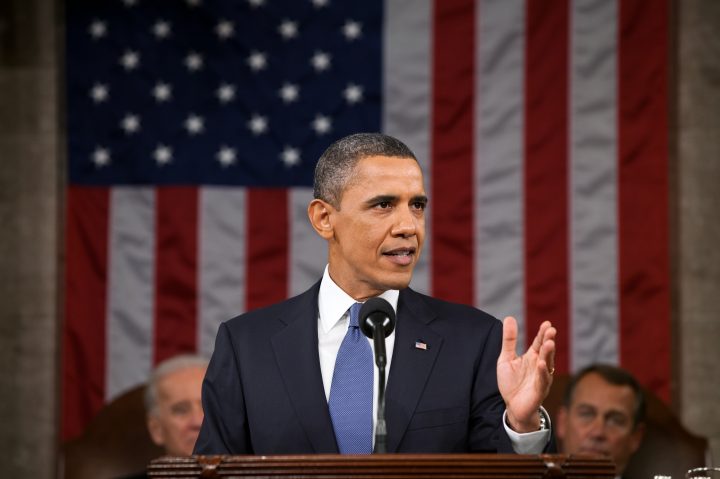
Commemorative Speaking and the Future
Often, inspiring commemorative speeches goes beyond celebrating past or present accomplishments to give the audience hope for the future. Take the case of famous personalities like Nelson Mandela or Dr. Martin Luther King. These two men may come from different parts of the world, but they stood up for something that inspired the people to stand up for what is right and combat the injustices that they face despite all odds (Mandela against racism in Africa and Dr. Martin Luther King for equal rights for all African-Americans); some people would refer to these personalities in their speeches. Try to consider how the speaker can link past, present, and future in a commemorative speech. You may also see introduction speech
Commemorative Speech Example
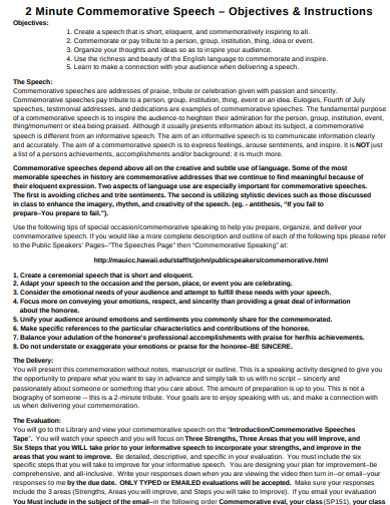
Size: 13 KB
Sample Commemorative Speech
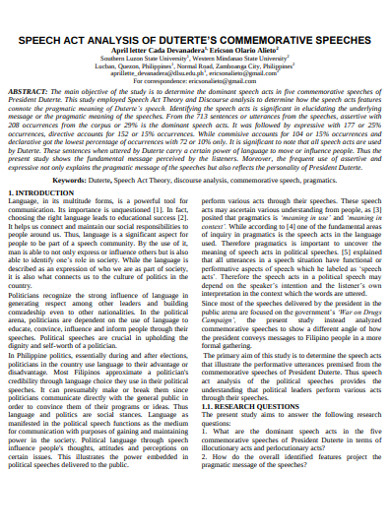
Size: 444 KB
Commemorative Speech in PDF
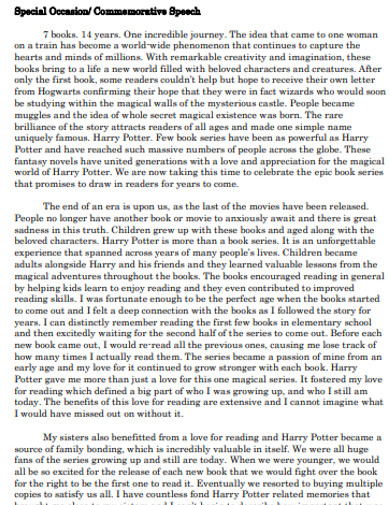
Size: 117 KB
Language becomes an essential part of effective commemorative speeches especially when using stories, illustrations, and figurative language to help the audience to relate your experience.Note that it is difficult to pay tribute to trivial topics. Therefore, a commemorative speech on, say, “tailgating parties” would not be appropriate. You may also see farewell speech
This speech is about what is most important to society –honor, trust, gentleness, etc.

Brainstorming Topic Ideas
Before writing a commemorative speech, brainstorm some ideas for information that you could include in your speech according to YourDictionary , an affiliate of LoveToKnow Media .
- What memories, ideas, or information about this person would you want to share with a greater audience?
- How can you respectfully share the significance of this person with others?
- What stories would you want to hear when listening to this commemorative speech?
The end goal of your commemorative speech should not only be to make the audience remember your words of wisdom, but to fully express yourself in order to motivate others to feel strongly as well. Oftentimes, these speeches are filled with emotion, and other times, they are filled with inspiration, hope, and information.You may also see motivational speech
Commemorative Speechwriting
As you write your speech, make sure you have friends or colleagues who are willing to listen to your draft before finalizing your speech. The spoken word – especially when words are caught between tears of sadness – can be difficult to understand, so something on paper that makes sense might not be easy to understand aloud. You are going to need to rely on others for advice about changing phrasing, word order, and even speech patterns so that what you write becomes comprehensible. Keep this in mind as you formulate your speech on paper. You may also see declamation speech
Think about the person, place, or other thing that is being praised through your speech.
- Can you balance tradition and formality with personal touches within your speech?
- Make sure that your words are respectful: Lots of people will hear this speech, and some might judge you based upon the stories you share and the speech elements you include.
- Write from the heart. It is obvious when you are speaking about something you care very little about.
If you are not inspired, talk to others who have been motivated and inspired by the thing you are commemorating, and see if you can draw ideas and inspiration from their passion.
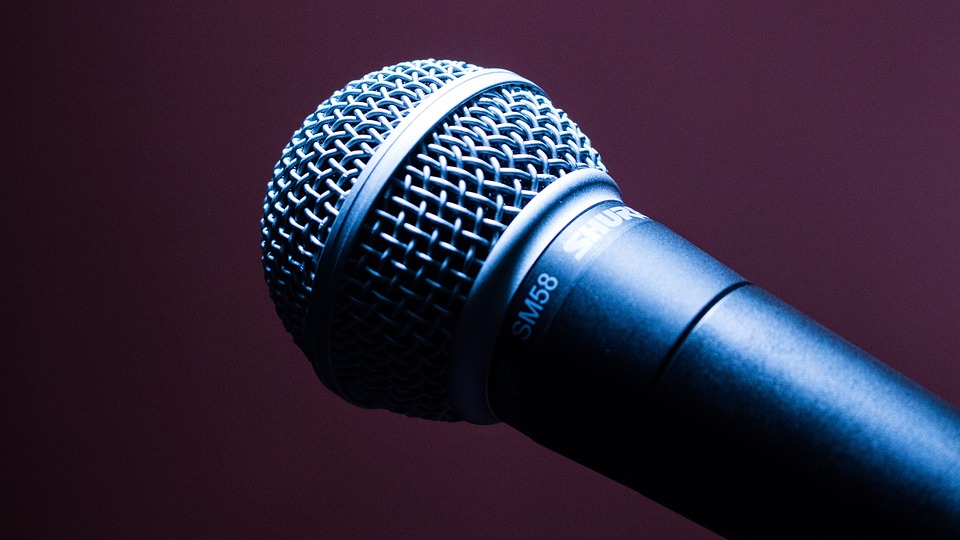
Tips and Tricks for Writing Your Best Speech
Keep in mind that depending on the type of speech you will be delivering and to whom you will be speaking to, it is important that you adjust the content of the message and perhaps some of the terminologies present in your speech, so that the audience can understand your speech better. You may also see leadership speech .
- Clarity and conciseness are key in delivering an awesome speech. Try to take the time to explain things instead of using jargon that might leave the audience confused.
- Avoid talking down to an audience of professionals. Make it a point that your tone is reserved and respectful instead of boastful of your own knowledge.
Remember that this speech is not about you, nor is it in reality about the person being commemorated. The key is to speak for the audience. You are really there to help people deal with their feelings, let them express themselves, and to represent the collective voice. You may also see welcome speech .
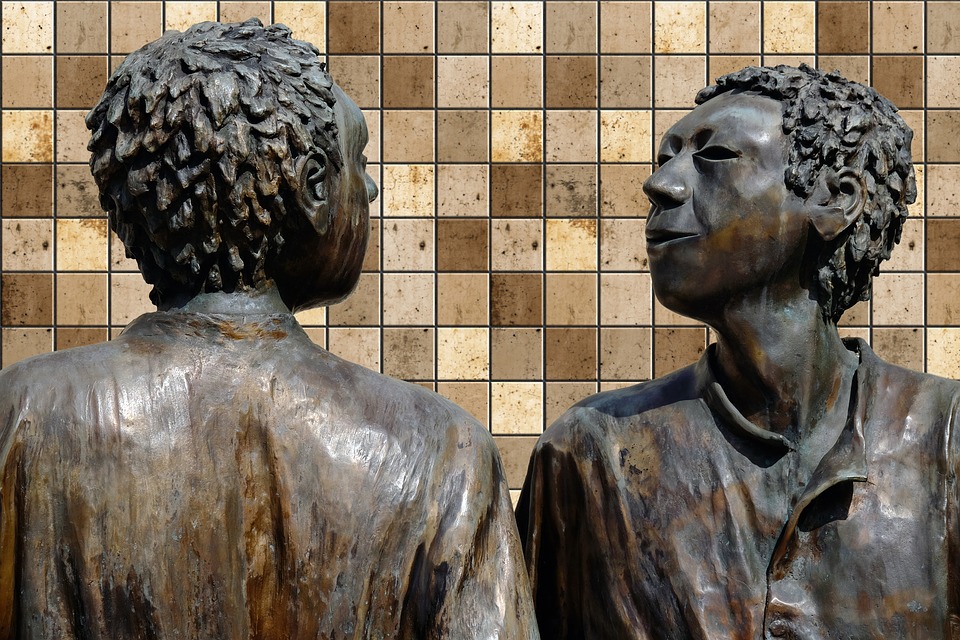
Do not use this speech as a chance for self-promotion or to share your hubris. If you are worried about how people will perceive you, remember that if you can give a selfless speech, this will speak more than threading personal pats-on-the-back throughout your speech.When writing a commemorative speech, keep it simple, respectful, and honorable. It is common courtesy, after all. You may also see informative speech
Basic Commemorative Speech
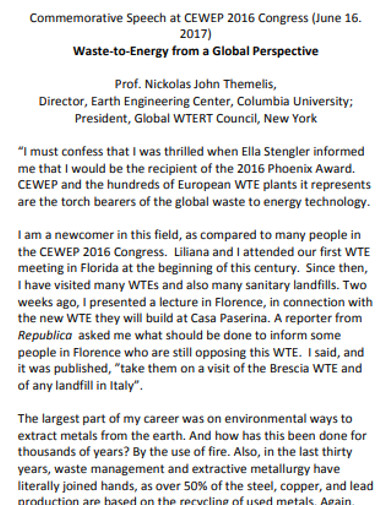
Size: 73 KB
Commemorative Meeting Speech
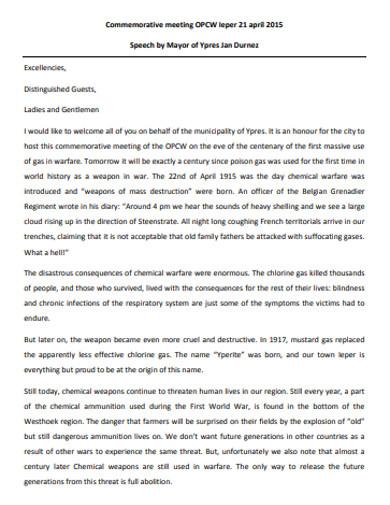
Size: 188 KB
Text prompt
- Instructive
- Professional
Write a Commemorative Speech honoring a historical figure.
Create a Commemorative Speech for an anniversary of a significant event.

Commemorative Speech Examples: Remembering With Style
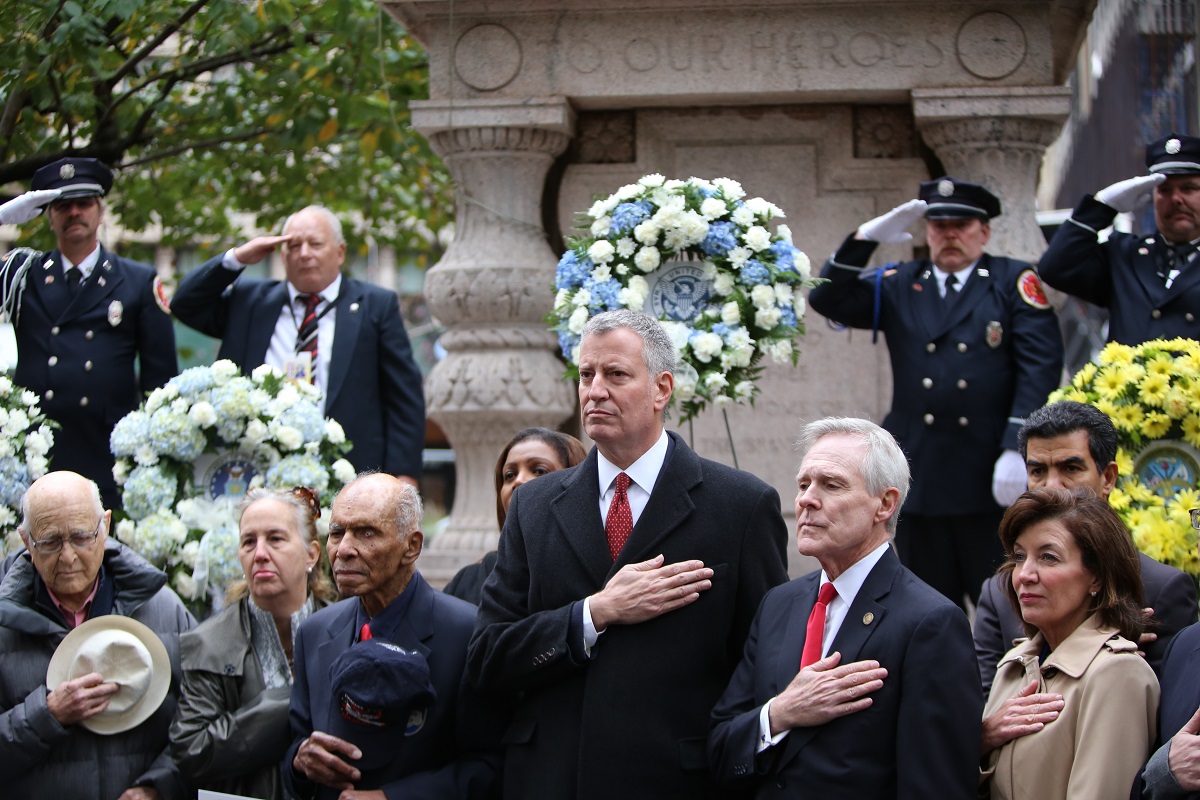
A commemorative speech aims to inspire the audience as they think about the life and achievements of a person at times such as their birthday, anniversary, or death. Commemorative speech examples show how to remember an event, company, or occasion.
A commemorative speech (also known as an epideictic or ceremonial speech) pays tribute to a person, a group, or an institution. It can also spotlight a momentous event that has happened in the past.
Public speaking and speech writing professionals usually deliver or write this type of speech during or for special occasions, such as anniversaries, graduations, retirement parties, memorial services, dedications, and award ceremonies.
Table of Contents
Why Are Commemorative Speeches Given?
Commemorative speeches can contain elements of an informative speech, persuasive speech, motivational speech, and even extemporaneous speech. However, the main purpose of this special occasion speech is to celebrate human values and, ultimately, spark inspiration and hope.
In a tribute speech , a type of commemorative speech, the aim is to commemorate the accomplishments of the subject and their impact on the community or society. In a eulogy , the highlight is the legacy and positive attributes of the deceased. In a retirement or graduation speech or a farewell speech, the piece emphasizes achievements and inspires the audience to look ahead with hopeful eyes. Meanwhile, an award acceptance speech spotlights the recipient’s feat and the people who helped them achieve it.
There are various types of ceremonial speeches. But by the end of effective commemorative speeches, speakers would want to uplift the audience’s emotions, making them feel optimistic about the future. Their goal is for the audience members to remember the things they’ve discussed on a good note and let their speech resound positively even well after they delivered their piece.
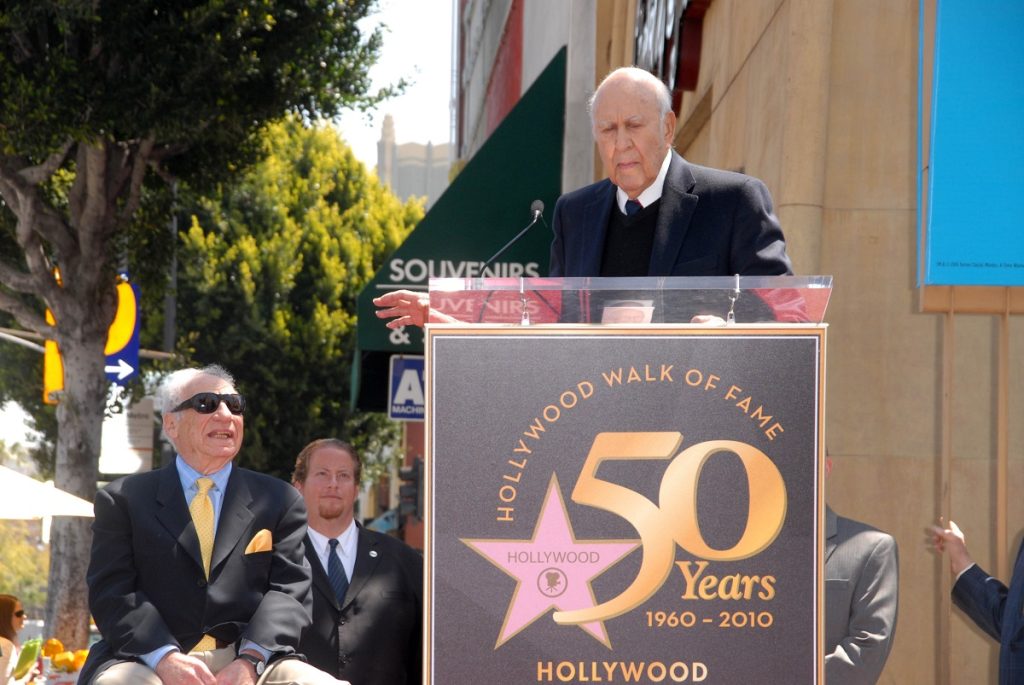
What Is The Structure Of A Commemorative Speech?
A commemorative speech outline follows the structure of just about any kind of speech. It has:
- An introduction. The intro presents your topic, its relevance, and your purpose. It’s also a suitable time to capture your audience’s attention.
- A body. After the intro, you will discuss your main points, complete with supporting proof (in the form of anecdotes, personal stories, expert opinions, and studies).
- A conclusion. A good commemorative speech ends with a conclusion summarizing the vital points you touched upon. Your goal here is for your audience to remember your core message.
How Do You Start A Commemorative Speech Example?
Writing commemorative speeches is challenging. After all, you’re tasked to hit a big goal: to celebrate something or someone and evoke positive feelings among the audience members.
You might ask: How do you begin writing a truly inspiring commemorative speech?
First, you must choose a theme in line with the person, group, institution, or event you’re commemorating. For instance, if you’re delivering a speech paying tribute to war comrades, your theme can be human courage and resilience.
Then, you can brainstorm with your peers for commemorative speech ideas. Doing such sessions will also help you gain insights into how you will frame your narrative in a way that cohesively conveys your key messages. Discussing your speech with others can also aid you in gathering perspectives and research materials to strengthen your speech’s impact.
Afterward, you can craft an outline following the structure above. Remember that you need to have a great attention-grabber in the intro. Whether you’re telling a story recounting a past happening, presenting a “what if” scenario, or stating an interesting fact, you intend to hook your audience to stay with you until the end. You can even use figurative language to help build a personal connection or creatively pique the audience’s curiosity.
What Is The Tone Of A Commemorative Speech?
There’s no definitive writing guide when it comes to the tone of a commemorative speech, as your piece will depend on the specific occasion and your relationship with the subject, among others. For instance, you can inject an appropriate sense of humor in a eulogy if you’re close with the deceased and the audience members.
However, generally speaking, your speech should have a positive tone. It should sound respectful, reflective, and inspiring.
What Does A Commemorative Speech Examples Cover?
While commemorative speeches follow the intro-body-conclusion template, many distinctive elements comprise this type of speech.
Throughout the speech, you can pepper your narrative with a personal touch, sharing stories, experiences, and memories relevant to the subject. This will help you humanize the topic and create a stronger, deeper personal connection with the audience.

In the speech, you must also cover the great qualities and milestones of the person, group, thing, or event you’re commemorating. The goal is not just to share their achievements and turn the limelight on their impact and influence. More importantly, you want these things to uplift your audience members and inspire them — and even yourself — to make their and your legacy.
In this speech by Katherine Gosvener, voted third best at Northwest University’s Advanced Speech course, she paid tribute to her deceased grandmother. Here’s how her introduction went:
“Anticipation fills the air as our old blue minivan turns onto LeFebvre Way, the street where grandparents live. Time seems to move a little slower as we pull up to the house my grandparents have lived in since their children were little, the house my grandfather built. It’s Spring, so the lawn has been mowed, and all the plants are green and beautiful. After we park the van, I step out and breathe in the fresh scent of flowers. As I look around, I see the source of the aroma: the gardenias my grandmother had planted, her favorite. Before we’ve even started walking toward the door, Grandma LeFebvre bursts through the front door with her usual greeting: ‘Hello There! Hello!'”
These are the memories that I have missed since my grandmother, Florence MacBurney LeFebvre, passed away two years ago on April 5, 2005.”
In the body , she brought up stories about flags, potato salad, and grandma’s love of the cowboy who became her grandfather that depicted the characteristics of her deceased loved one.
She concluded her piece with this powerful conclusion:
“The separation that her husband, children, and us grandchildren have experienced has been difficult. However, it is a comfort to remember that she became a Christian in a little church in Pinole 33 years before she passed away. I have great joy in the knowledge that someday, I will be reunited with her. I only hope that when I become an old woman, my husband can say that I am endearing, my children can say I’m an encouragement, and my grandchildren will know that I’m enamored with them. I know that when I reach the end of my days, she will be right there at the door of Heaven with the long-awaited greeting: ‘Hello There! Hello!'”
What Are Some Commemorative Speech Topics?
When selecting commemorative speech topics, you must choose something that genuinely matters to you. Even casual listeners can detect whether you’re speaking from the heart. So, make sure that your topic is something that you can authentically talk about.
Also, while you need not be an expert on it, you must have a sufficient understanding of your subject matter. It will help you confidently deliver your piece. Moreover, you must choose a topic that’s relevant to your audience.
Here are some topic ideas to kickstart your research and selection process.
- Your ultimate hero or mentor (it could be a family member or your high school teacher)
- A tribute to your favorite place
- A look at a loved one’s life and legacy
- Your childhood or upbringing
- Your family or marriage life
- Your career or dream job
- A prominent event in your neighborhood city
- An event that shaped your country
- A transformative movement (for example, the civil rights movement)
- A tribute to an important historical figure
- A tribute to someone who overcame a difficult challenge
- An example of positive human traits (e.g., hard work, loyalty, resilience)
What Are Some Famous Commemorative Speech Examples?
Finding inspiration for a commemorative speech is easy, thanks to the abundance of commemorative speech examples you can read online. Here are some of them.
Remarks by President Barack Obama at the Martin Luther King Memorial Dedication
“Our work is not done. And so, on this day, in which we celebrate a man and a movement that did so much for this country, let us draw strength from those earlier struggles. First and foremost, let us remember that change has never been quick. Change has never been simple or without controversy. Change depends on persistence. Change requires determination. It took a full decade before the moral guidance of Brown v. Board of Education was translated into the enforcement measures of the Civil Rights Act and the Voting Rights Act, but those 10 long years did not lead Dr. King to give up. He kept on pushing; he kept on speaking, he kept on marching until change finally came.”
Steve Jobs’s Commencement Speech at Stanford University
“Your time is limited, so don’t waste it living someone else’s life. Don’t be trapped by dogma — which is living with the results of other people’s thinking. Don’t let the noise of others’ opinions drown out your own inner voice. And most important, have the courage to follow your heart and intuition. They somehow already know what you truly want to become. Everything else is secondary.”
Oprah Winfrey’s Acceptance Speech for the Cecil B. Demille Award at the Golden Globe Awards
“I want all the girls watching here and now to know that a new day is on the horizon! And when that new day finally dawns, it will be because of a lot of magnificent women, many of whom are right here in this room tonight, and some pretty phenomenal men, fighting hard to make sure that they become the leaders who take us to the time when nobody ever has to say, ‘Me too’ again.”
Recent Posts
Active Listening Absorbs The Whole Message, Not Just The Words
Active listening goes beyond hearing the words someone is saying to you and understanding the message they are conveying. Many only hear a small percentage of what is being said as they are...
Counteracting Fear Of Public Speaking With Coaching And Therapy
Nearly 75% of people experience the social phobia of fear of public speaking. The result may be nervousness before speaking or a full-blown panic attack. Practicing public speaking may lessen the...
Stay ahead of the AI revolution.

How to Write a Commemorative Speech: A Step-by-Step Guide
Commemorative speeches are powerful tools for paying tribute to someone or something that has had a significant impact on our lives. Crafting a commemorative speech can seem like a daunting task, but it doesn't have to be. In this step-by-step guide, we'll take you through each stage of the process, giving you the tools and techniques you need to create a powerful and inspiring tribute.
Understanding the Purpose of a Commemorative Speech
Commemorative speeches hold a special place in the world of public speaking. They are an opportunity to honor and celebrate a person, an event, or an idea that has left a lasting impact on you or the people around you. Whether it's a eulogy for a loved one or a tribute to a historical figure, a commemorative speech is a chance to pay tribute to someone or something that has touched your life.
Honoring the Subject
When it comes to writing a commemorative speech, the subject is the heart and soul of your message. Whether it's a person, an event, or an idea, take the time to research and understand your subject thoroughly. Think about what makes them unique, and what they have accomplished that deserves recognition.
As you begin to outline your speech, consider highlighting the key moments or accomplishments in the subject's life. Share stories that showcase their character, traits, and achievements. Be sure to personalize your speech and make it relevant to your audience.
Inspiring the Audience
A commemorative speech should aim to connect with the emotions of your audience. It should inspire them to action or reflection. To achieve this, choose words that are both poetic and memorable. Use language that evokes strong emotions and creates a powerful and moving response from your audience.
Consider using rhetorical devices such as repetition, alliteration, and metaphor to make your speech more engaging. These devices can help you create a sense of rhythm and flow that will keep your audience engaged throughout your speech.
Sharing Personal Experiences
One of the most effective ways to connect with your audience is by sharing personal experiences related to the subject. Personal stories imbue the speech with authenticity and make it relatable to the audience. When sharing personal experiences, aim to balance sentiment with objectivity, keeping them relevant to the speech's subject and mission.
Sharing personal experiences can also help you establish a connection with your audience. It shows that you are not just a speaker but a person with emotions and experiences that you share with the audience.
In conclusion, a commemorative speech is an opportunity to honor and celebrate a person, an event, or an idea that has touched your life or the lives of those around you. By honoring the subject, inspiring the audience, and sharing personal experiences, you can create a powerful and moving speech that will leave a lasting impact on your audience.
Choosing the Right Tone and Style
The tone and style of your commemorative speech are essential to getting your message across effectively. You want to make sure that the tone and style of your speech are consistent with your subject and the message that you want to convey. This can be achieved by considering the formality of your setting, your audience's expectations, and your personal comfort level in delivering the speech.
Formal vs. Informal Language
The choice between formal or informal language is an essential element of creating a commemorative speech. Formal language is more appropriate for somber or serious events, placed in more formal settings, or dedicated to reflecting on historical achievements. By contrast, informal language is better suited for more relaxed, non-traditional events, or subjects that are more lighthearted.
Using Anecdotes and Quotes
Anecdotes and quotes are powerful tools for creating a moving and memorable commemorative speech. Carefully selected quotes and anecdotes lend gravitas, humor, and emotion to your speech. They should be personalized, relevant to your speech's subject, and, wherever possible, delivered from the subject's perspective.
Balancing Emotion and Facts
When crafting your commemorative speech, it's crucial to strike a balance between emotional appeals and factual accuracy. Be sure to incorporate enough factual information to ensure that your speech is informative and credible, while also evoking an emotional response in your audience.
Researching the Subject
Before you begin writing your commemorative speech, you must do your due diligence in researching the subject. This includes gathering information, conducting interviews with friends and family, and fact-checking for accuracy. It's essential to have an accurate representation of your subject and their contributions before you begin writing your speech.

Gathering Information
Gathering information about your subject is best done through extensive research. This can be achieved by reading books, articles, and other primary source material. Make sure to keep track of the information you gather, noting important dates, achievements, and other relevant details that may feature in your speech.
Interviewing Friends and Family
Interviewing friends and family is another critical tool in researching your commemorative speech. This can provide valuable insights into your subject's character, experiences, and relationships, as well as offer new leads for research and inspiration.
Fact-Checking and Accuracy
Fact-checking and verifying information is essential in ensuring the accuracy of your speech. Make sure to double-check information to avoid any factual errors. Doing so will lend credibility to your speech and help establish you as an authoritative voice on the subject.
Crafting a Compelling Introduction
The opening of your speech is crucial in capturing your audience's attention. A compelling introduction prepares your audience for what's to come by establishing the theme and setting the tone.
Capturing Attention
Capturing your audience's attention can be achieved through humor, creativity, or through a profound statement or question. Choose a hook that resonates with your audience and creates a memorable impression.
Establishing the Theme
The theme of your speech should be clear from the beginning. Establishing the subject, and the occasion can help your audience understand your speech's purpose and focus. The theme should be reinforced throughout the speech to tie everything together in a cohesive narrative.
Setting the Tone
The tone of your commemorative speech sets the mood for the rest of your speech. It should be consistent with your speech's subject and purpose, and suited to the audience and setting. Aim to balance respect and formality with authenticity and emotion to create a moving and memorable tribute.
ChatGPT Prompt for Writing a Commemorative Speech
Chatgpt prompt.
Compose a speech that honors and pays tribute to a person, event, or group that has made a significant impact or contribution to society, culture, or history. This speech should express gratitude, admiration, and respect towards the subject being commemorated, while also highlighting their achievements and legacy. The speech should be thoughtful, eloquent, and engaging, capturing the essence of the person or event being celebrated and inspiring the audience to reflect on their own values and aspirations.
[ADD ADDITIONAL CONTEXT. CAN USE BULLET POINTS.]
Writing a commemorative speech is a way to honor someone or something that has impacted your life or others' lives. By following this step-by-step guide, you can create a powerful and inspiring tribute that will leave a lasting impression. Remember to honor the subject, inspire the audience, share personal experiences, balance emotion, and accuracy, and choose the right tone and style for the occasion. With careful research, thoughtful writing, and an emotive delivery, your commemorative speech is sure to be a success.
Recommended Articles
How to write a toast speech: a step-by-step guide, how to write a presentation speech: a step-by-step guide, feeling behind on ai, get the latest ai.


How to Write and Deliver a Commemorative Speech (With Examples)
- The Speaker Lab
- July 4, 2024
Table of Contents
Delivering a commemorative speech is an art that captures hearts and minds, honoring milestones or influential figures. A powerful tribute can turn a moment into a lasting memory, but crafting such an address demands skill. In this article, you’ll learn the ropes of creating speeches that not only celebrate achievements but also stir emotions deeply.
Together, we’ll walk you through structuring your words for impact, digging deep with research to bring authenticity, and choosing language that resonates. From mastering delivery techniques to overcoming speaking hurdles, this guide offers practical advice for making your next commemorative speech unforgettable.
Understanding Commemorative Speeches
A commemorative speech is a tribute that celebrates and honors an individual, group, or event. It weaves the threads of memory and respect into a tapestry that covers us with warmth on days of reflection.
The heart of these speeches lies in their purpose—to stir emotions, to kindle admiration, and to etch memories more deeply within our minds. Whether honoring heroes at veteran events, paying homage during anniversaries, or remembering loved ones at memorials, each speech serves as a verbal monument.
But what sets these speeches apart? While other types of speeches use broad strokes, commemoratives are all about fine detail. They require not just facts but feelings because they aim to touch souls as much as inform minds.
Crafting the Perfect Tribute
When delivering a commemorative speech, you want your audience hanging onto every word. Start by laying down roots in storytelling soil —the story behind who or what you’re celebrating gives life to your words. Use language that paints pictures so vividly listeners can’t help but see them when they close their eyes.
Tell tales that resonate; share anecdotes that bring laughter through tears because great stories beat at the heart of unforgettable tributes.
The Role of Research in Commemorative Speeches
Dig deep when researching for your speech—it’s how you find gems others might miss. Historical tidbits can turn simple praise into an epic narrative worthy of its subject while facts lend credibility.
Sourcing from reputable sites such as the National Archives adds depth and authenticity, ensuring audiences walk away feeling enlightened—not just moved emotionally but intellectually enriched too.
Learn How You Could Get Your First (Or Next) Paid Speaking Gig In 90 Days or Less
We receive thousands of applications every day, but we only work with the top 5% of speakers .
Book a FREE call with our team to get started — you’ll learn why the vast majority of our students get a paid speaking gig within 90 days of finishing our program .
When it comes to commemorative speeches, the perfect tribute strikes a delicate balance between honoring someone’s legacy and sharing that significance with an audience. It’s about weaving personal anecdotes with universal truths in such a way that listeners feel connected not just to the person you’re celebrating but also to their own experiences.
The Essence of Storytelling in Your Commemorative Speech
A memorable tribute is anchored in storytelling. Good stories have power; they resonate deep within us and create lasting impressions. To get there, think of moments where your subject shined brightest or impacted others profoundly. Share these instances because they give weight to why we celebrate them today—and let people feel like part of their story too.
Structure Your Commemorative Speech for Impact
Every speech needs a structure that holds it together. For tributes, start by introducing who this person was beyond titles or accolades: reveal their character, spirit, and heart. Once you’ve built you foundation, layer tales of triumphs and trials before examining how this individual changed lives or left their mark on the world.
Crafting an outline first can help you organize thoughts clearly. Remember though—it’s not set in stone. Flexibility allows spontaneous moments during delivery when inspiration strikes hard.
Finding the Right Words for Your Commemorative Speech
Selecting language isn’t about SAT vocabulary; rather, choose words that echo authenticity and warmth. Whether simple expressions or rich descriptors, the aim here is genuine connection over linguistic acrobatics.
If you decide to use humor in your speech, wield it wisely lest levity undercuts sincerity. Every word in your speech should serve your ultimate goal: to honor meaningfully while stirring collective emotions amongst those gathered alongside you.
When you’re crafting a commemorative speech, think of it like an iceberg. What the audience sees, i.e., the tribute itself, is just the tip, while beneath lies the bulk of your work: research. Solid research gives your words weight and helps anchor them in truth.
Digging into historical records or personal anecdotes provides context that transforms a generic homage into a vivid portrait. In other words, exploring archives can unearth stories that breathe life into figures from history or shine light on lesser-known facets of their character.
Finding Authenticity Through Facts
An authentic narrative starts with facts; they are non-negotiables for speakers who want to be taken seriously. When honoring someone’s achievements, accuracy matters because it shows respect for both subject and audience alike.
Researching ensures that every claim you make stands up under scrutiny. Whether it’s through national archives, interviews with experts, or even social media deep dives, verifying information before sharing makes sure your speech rings true.
Giving Depth to Your Narrative
Beyond dates and data points lies depth. To capture the essence of your subject, weave together researched insights about struggles overcome and milestones achieved. This approach turns statistics into stories people care about because they resonate on a human level. Achieving this outcome can happen in several ways.
- Gather personal testimonials to highlight individual impact beyond public accomplishments.
- Pore over letters, emails or journals if available. These often contain emotional truths which numbers alone cannot convey.
- Leverage oral histories as primary sources; they offer perspectives not found anywhere else.
Incorporating such elements doesn’t just inform but also stirs emotions within listeners as they connect more deeply with what’s being commemorated.
Famous Commemorative Speech Examples
When we think about speeches that have left a mark on history, it’s often the emotional resonance of commemorative speeches that echo through time. Let’s look at some standout examples.
The Power of Personal Reflection: Lincoln’s Gettysburg Address
Abraham Lincoln’s Gettysburg Address is brief yet monumental. It transformed a grim battlefield into hallowed ground with words alone. This speech teaches us the art of saying more with less, proving you don’t need hours to make an impact—just the right words.
Lincoln didn’t just recite facts; he wove them into a narrative of sacrifice and unity, crafting something unforgettable in under three minutes. His approach was simple but profound—a model for any speaker aiming to leave a lasting impression.
Celebrating Heroism: Reagan Honors Challenger Astronauts
Ronald Reagan’s address after the Space Shuttle Challenger disaster showed how empathy can be channeled effectively in moments of national tragedy. He directly addressed the families, shared their grief, and by doing so comforted an entire nation watching in horror. Reagan’s tribute brought solace when words seemed insufficient—and isn’t that what great speaking is all about?
Visionary Eulogizing: MLK’s Drum Major Instinct Sermon
Martin Luther King, Jr.’s Drum Major Instinct sermon , given two months before his assassination, showcases his unique ability to turn introspection into inspiration for others’ lives—an essential skill for any commemorator seeking depth and authenticity. This powerful example illustrates how personal experiences can transform our understanding of collective history while inspiring future generations to carry forward those legacies with purpose and passion.
The Graceful Goodbye: Lou Gehrig’s Farewell Speech
Lou Gehrig stood before fans at Yankee Stadium grappling with an incurable disease, yet he declared himself “the luckiest man on the face of this earth.” His heartfelt gratitude amidst adversity reminds speakers everywhere that poignancy often lies in perspective—not just circumstance.
Audience Engagement Strategies for Your Commemorative Speech
When you’re up there giving a commemorative speech, it’s not just about honoring someone or something; it’s also about pulling your audience into the moment with you. Think of it as creating a shared experience that will stick in their minds long after they leave.
Start with What They Know
Tapping into shared knowledge can light up familiar sparks for listeners. If we’re commemorating an influential person, mentioning their well-known work can immediately draw people in. Weaving personal anecdotes alongside these known facts makes the speech more relatable and alive. It’s like putting together a puzzle; each piece should help paint a complete picture that resonates personally with everyone listening.
Interactive Elements Work Wonders
Incorporating interactive elements can keep folks on their toes—sometimes literally. Although it might not be the appropriate choice for every occasion, consider having your audience participate in an activity related to your tribute. For instance, you might have them stand to recognize military service if you’re talking about veterans or you might have them clap along to music connected with the celebrated figure or event.
This tactic transforms passive listeners into active participants, making the occasion memorable because they were part of it too.
Pace Your Storytelling Like a Pro
Pacing your narrative is a crucial part of keeping your audience engaged. Break down stories within your speech as if they were scenes from a movie—build suspense then deliver catharsis when needed. Mixing moments of reflection with uplifting beats ensures that while hearts may be heavy at times during remembrance, spirits will also soar throughout your delivery.
Tone and Language Considerations
When crafting a commemorative speech, it’s important to pay attention to the words and tone that you use. A too casual tone might underplay the gravity of the occasion, while overly formal language can come across as stiff.
Think about it like this: if you’re paying tribute to an individual’s achievements or life’s work, would slang do justice? Probably not. But will Shakespearean English capture their modern-day impact? Again, no. It’s all about finding language that reflects both respect for the subject and relatability to those listening.
To hit just the right note, remain conversational yet poignant in delivery; something akin to sharing stories over dinner rather than reading from an ancient scroll.
You’ll also want to consider inclusivity because chances are your audience is diverse, so keep jargon out unless it’s widely understood. To make sure everyone feels part of this collective experience, use anecdotes and universal truths that they can connect with.
The Importance of Delivery in Commemorative Speaking
When giving a commemorative speech, it’s not just what you say but how you say it. Your delivery breathes life into words, transforming them from mere text to a powerful tribute.
Vocal Variety: The Melody Behind the Message
Vocal variety is the power to change your tone, pitch, volume, and pace of your speech. With vocal variety, your message becomes more than facts and figures; it becomes an engaging performance. A well-timed whisper or an emboldened statement can carry far more weight than monotone recitation ever could. In addition, a change in pitch helps emphasize critical points while strategic pauses give listeners time to reflect on what has been said. This dynamic approach keeps ears tuned in and hearts open to your homage.
Pacing: Setting the Rhythmic Pulse of Your Words
The pace of your speech is like pacing across a room—too fast and you trip over emotions; too slow and interest wanes. Finding that sweet spot where every word can be savored is key for impact.
Generally speaking, you’ll want to speed up through lighter anecdotes but slow down when sharing profound insights or expressing deep gratitude. This gives each part its due importance within the narrative arc.
Body Language: Unspoken Emotions Speak Volumes
Sometimes what we don’t say speaks louder than our words. This is where body language comes into play during commemorations. Toastmasters International highlights how gestures, facial expressions, and even posture communicate volumes about sincerity, respect, and honor towards whom or whatever we’re commemorating.
For instance, an upright stance conveys confidence while gestures can illustrate stories better than adjectives might alone. Let these silent cues complement your spoken ones for full emotional resonance with audiences large or small.
Find Out Exactly How Much You Could Make As a Paid Speaker
Use The Official Speaker Fee Calculator to tell you what you should charge for your first (or next) speaking gig — virtual or in-person!
Overcoming Challenges in Commemorative Speaking
Commemorative speaking isn’t always smooth sailing. While on stage, you just might face an emotional whirlwind or find yourself before a crowd that isn’t reacting how you’d hoped. Let’s look at some strategies for tackling these challenges.
Navigating Emotional Overwhelm
The weight of delivering a speech that honors someone or something significant can sit heavily on your shoulders. The trick is channeling those emotions into power rather than letting them capsize you mid-speech. Practicing beforehand lets you prepare yourself so that your emotions don’t catch you off guard when it counts.
Remembering to breathe deeply can also keep nerves and tears in check, ensuring clear delivery throughout your performance. This simple act becomes an anchor, grounding you even amidst strong currents of emotion.
Addressing Audience Diversity
Audience diversity is another hurdle since what resonates with one person may not echo with another. So how do we bridge this gap? Start by crafting universal themes within your speech: love, loss, triumphs—the human experience has common threads everyone can grasp onto.
Tailoring anecdotes that have broad appeal also helps build bridges across varied perspectives without losing personal touchstones crucial for authenticity and connection.
Pivoting Strategies Mid-speech
Sometimes despite our best efforts things just don’t land right. Pivoting strategies mid-speech without breaking stride or looking flustered isn’t easy but sometimes necessary. If one approach doesn’t resonate well with listeners, consider subtly shifting gears, using different examples, or altering tone to regain engagement quickly and smoothly.
FAQs on Commemorative Speeches
What is a commemorative speech.
A commemorative speech honors significant events or individuals, stirring emotions and spotlighting values.
What is an example of commemorative?
An example includes eulogies, retirement tributes, and milestone anniversary speeches that celebrate achievements.
Which of the following is an example of a commemorative speech?
Martin Luther King, Jr.’s “I Have a Dream” echoes as a timeless tribute to civil rights progress.
How do you start a commemorative speech sample?
Kick off with an impactful quote or story that connects deeply with your audience’s shared experiences.
Mastering the art of a commemorative speech means telling a story, honoring legacies, and connecting people. Today, you’ve learned to weave emotion into narratives that resonate. In addition to emotion, you also learned about the power of research, your foundation for authenticity. Research gives life to facts and depth to accolades.
Captivate audiences by engaging them as participants in celebration. Use language that sings and delivery that stirs souls. And when challenges arise? Stand firm. Adapt your tone, read the room, breathe deep—and speak from the heart.
Your next commemorative speech won’t just recount history; it will inspire memories treasured long after applause fades away.
- Last Updated: July 3, 2024

Explore Related Resources
Book a call with our team to get started — you’ll learn why the vast majority of our students get a paid speaking gig within 90 days of finishing our program .
If you’re ready to control your schedule, grow your income, and make an impact in the world – it’s time to take the first step. Book a FREE consulting call and let’s get you Booked and Paid to Speak ® .
About The Speaker Lab
We teach speakers how to consistently get booked and paid to speak. Since 2015, we’ve helped thousands of speakers find clarity, confidence, and a clear path to make an impact.
Get Started
Let's connect.
Copyright ©2023 The Speaker Lab. All rights reserved.
Speech And Debate
Commemorative Speech
Last updated on: Feb 9, 2023
Commemorative Speech: Guide to Craft an Engaging Speech
By: Cordon J.
Reviewed By: Chris H.
Published on: Sep 15, 2020

A commemorative speech is also known as a ceremonial speech. It is a type of speech given on a special occasion or event to celebrate a particular situation, event, or a person/group. It is mostly given to pay tribute or show gratitude towards an event, idea, or person.
By commemorating you inspire or give the audience hope for the future, boost their feelings and emotions.
To learn how to craft effective commemorative speeches, give this article a thorough read.

On this Page
What is a Commemorative Speech
As we mentioned earlier, a commemorative speech is a form of public speaking where the main purpose is to celebrate a particular thing.
Most students in the United States are asked to deliver an inspiring commemorative speech at the graduation ceremony. Here students express their gratitude towards their college, professors, family, classmates, etc.
For such occasions, you must write from the heart, reminiscing about the past and the important events. This kind of speech includes personal touch and the tips and tricks given here will help you write a speech successfully.
Commemorative speech requires a focus on the past, present, and future aspects of the topic. For instance, success, loyalty, wisdom, courage, hope, etc.
It can also be an award acceptance speech, or a eulogy to honor someone after their death. Now that you have understood the commemorative speech definition, let’s take a look and learn how to write a commemorative speech?

Tough Essay Due? Hire Tough Writers!
Commemorative Speech Outline
Just as any other piece of writing, a speech follows a particular outline and structure.
Begin the speech by stating the significance of your topic.
Make it interesting to grab the audience’s attention. If you’re talking about a person, share an interesting thing that they did or said. If your speech is about a particular event, discuss how it brings different people together, etc.
Your reason for paying tribute.
Why are you paying tribute to your subject and the kind of tribute? Why should they be honored and why at this particular event.
Highlight their achievements.
Next, talk about the contributions and accomplishments with examples and evidence.
Importance of these achievements.
Highlight the importance of these accomplishments, who benefits from them? How are these efforts valuable to us?
Make the audience empathize.
If talking about a person, make the audience think about how they can also become like that person, what practices can we learn and adopt?
In this section, the transition towards a brief summary of the speech. Share an anecdote or short story.
Commemorative Speech Examples
COMMEMORATIVE SPEECH EXAMPLE
COMMEMORATIVE SPEECH SAMPLE
How to Choose a Commemorative Speech Topic
When asked to deliver a commemorative speech for a class, you must first brainstorm different ideas that can be added to your speech.
Consider the following points in mind when brainstorming different topics:
Online Research
There is a list of commemorative speech topics available online. You can also find videos of previous commemorative speeches delivered at your school or by celebrities, etc.
Brainstorming potential ideas will enable you to come up with a topic relevant to you and your personal situation.
In order to make your speech and topic meaningful, think of the things you would want to share about the person. Or the information you want to share with others about a situation or event.
When thinking about the different stories to add, consider sharing that maybe you would want to hear in a commemorative speech.
If you are talking about a person then think of ways how you can share things about them respectfully, without offending them or anyone else.
Understand Your Audience
The most important ingredient that makes any piece of writing or speech work is the audience. It is they who decide whether or not the piece was worth it.
In order to ensure that you stay relevant to the audience, keeping in mind their interests and personalities and build your work around that.
Also, if you are going to mention someone directly in your speech you must be aware of the people who are going to be there.
Convey a Meaningful Message
A commemorative speech is a type of informative speech where the aim is to inform the listener about a particular topic. Although the main goal is to praise or commemorate something, your message must be clear and meaningful throughout the rest of the speech.
A speech writing guide will help you create an impactful and impressive speech.
Paper Due? Why Suffer? That's our Job!
Commemorative Speech Topics
There are several different categories of commemorative speech ideas depending upon the event or occasion.
Here are some of our best suggested commemorative speech ideas that you can choose from:
- Paying tribute to a family member
- Paying tribute to an important personality, dead or alive (Martin Luther King, Barack Obama)
- Paying tribute to a big movement (Women's rights movement, the civil rights movement)
- Celebrating the values of a religion (Buddhist values)
- Speak on the importance of hope (NASA's Apollo 13 survival mission)
- Celebrate human courage, or a courageous act in a challenging situation by policemen, firefighters, veterans
- Selflessness of a teacher or parent, their dedication and love
- An act of compromise that marked the start of you becoming a mature and evolved person
- Show respect to the greatest travelers that ever lived (Christopher Columbus, Vasco da Gama)
- Eulogy for a professor at your college
- Speak about your transformation both spiritually and intellectually after starting college
- The series of events that lead to you and your classmates becoming a family
- A time you and your team won a match due to the support of the College
- Provide an example of loyalty by discussing war comrades
- What does freedom mean to you?
- Commemorate the lives lost on 9/11
- Celebrate the legalization of gay marriages
- Queen Elizebeth and her life
- Buying your first house
- Remembering your grandmother
- Women who changed the world for the better
- Father of the bride speech
- Maid of honor speech
- Best technology inventions
Here is a little activity for you to clarify the concept of commemorative speech. Which of the following is an example of a commemorative speech?
- A speech that demonstrates how to plan a wedding.
- A speech honoring the life of Martin Luther King.
- A speech telling the people where they can find the work of Vincent Van Gogh.
- A speech for the school board to get funding for the school dance.
These were some of the topics for a commemorative speech just to give you an idea of what direction to think in. You may use these topics as is, or brainstorm staying on this track and you'll have an inspiring topic to talk on.
If you are unable to come up with an engaging topic, feel free to reach out to the expert writers at 5StarEssays.com .
Request an essay for me ! Enjoy a well-crafted commemorative speech at the most affordable prices and leave everyone in awe.
Frequently Asked Questions
What is the goal of a commemorative speech.
A commemorative speech is delivered to inspire the audience and to pay tribute to a person. It highlights the qualities and works of the person.
Is eulogy a commemorative speech?
A eulogy is a kind of commemorative speech and it also includes other kinds of speeches also.

Cordon. is a published author and writing specialist. He has worked in the publishing industry for many years, providing writing services and digital content. His own writing career began with a focus on literature and linguistics, which he continues to pursue. Cordon is an engaging and professional individual, always looking to help others achieve their goals.
Was This Blog Helpful?
Keep reading.
- How to Write a Speech - Outline With Example

- Informative Speech Topics - Interesting Ideas By Experts

- Persuasive Speech Topics - 150+ Topics for Students

- 50+ Demonstration Speech Ideas for Your Next Great Speech

- Impromptu Speech Topics - 150+ Interesting Ideas

- Debate Topics (2024) - Top 200+ Compelling Topics

- 100+ Motivational Speech Topics for an Inspirational Speech

- Extemporaneous Speech - How to Write One Successfully?

- Graduation Speech - Write Your Best Graduation Speech

Say Goodbye to Academic Stress!
With FREE AI report, Turnitin report, bibliography, title page, and a lot more!
LIMITED TIME ONLY
People Also Read
- research paper writing
- research paper topics
- dissertation vs thesis
- ieee citation guide
- 500 word essay
Burdened With Assignments?

Advertisement
OFFER EXPIRES SOON!
© 2024 - All rights reserved

IMAGES
VIDEO